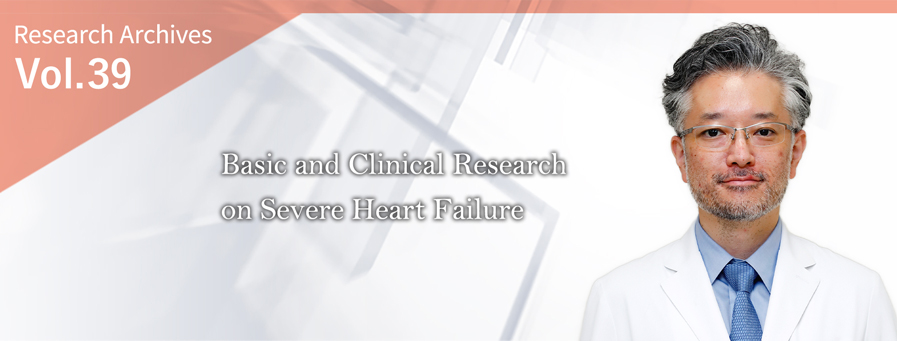
Department of Cardiovascular Surgery, Graduate School of Medicine, Hokkaido University
Satoru Wakasa M.D., Ph.DSurgery
- [Academic & Professional Experience]
-
- 1993.4–1999.3 : MD, Hokkaido University School of Medicine
- 1999.6–2000.5 : Resident, Department of Cardiovascular Surgery,
Sapporo National Hospital, Sapporo, Japan - 2000.6–2002.3 : Resident, Department of Cardiovascular Surgery,
Kushiro City General Hospital, Kushiro, Japan - 2002.4–2003.3 : Resident, Department of Cardiovascular Surgery,
Hakodate National Hospital, Hakodate, Japan - 2004.4–2009.1 : Clinical Fellow, Department of Cardiovascular Surgery,
Hokkaido University Hospital, Sapporo, Japan - 2003.4–2007.3 : PhD in Cardiovascular Surgery,
Hokkaido University Graduate School of Medicine - 2009.2–2014.6 : Assistant Professor, Department of Cardiovascular Surgery,
Hokkaido University Hospital, Sapporo, Japan - 2014.7–2017.3 : Associate Professor, Department of Cardiovascular and Thoracic Surgery,
Hokkaido University Graduate School of Medicine, Sapporo, Japan - 2016.6–2016.11 : Clinical Fellow, Department of Cardiothoracic Surgery,
Leiden University Medical Center, Leiden, Netherlands - 2017.4–2019.3 : Head of department, Department of Cardiovascular Surgery,
KKR Sapporo Medical Center, Sapporo, Japan - 2019.4–2020.3 : Associate Professor, Department of Cardiovascular and Thoracic Surgery, Hokkaido University Hospital, Sapporo, Japan
- 2020.5–2022.3 : Professor and Chairman, Department of Cardiovascular and Thoracic Surgery,
Hokkaido University Graduate School of Medicine, Sapporo, Japan - 2022.4–Present : Professor and Chairman, Department of Cardiovascular Surgery,
Hokkaido University Graduate School of Medicine, Sapporo, Japan
Research system to further advance comprehensive surgical care
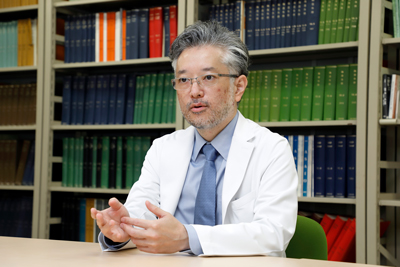
The Department of Cardiovascular Surgery provides a wide range of surgical treatments for severe heart failure and is responsible for related basic and clinical research. As the only facility in Hokkaido certified to perform heart transplants, the department has a system in place to provide comprehensive surgical treatment for severe heart failure, and performs complex, high-risk surgeries, such as surgeries on severely ill patients requested by affiliated facilities in Hokkaido. Professor Satoru Wakasa was appointed professor of this department in 2020. In addition to producing cardiovascular surgeons who are active in clinical practice, he is also committed to fostering young researchers who will contribute to the further development of medicine.
“In the clinical treatment of severe heart failure, heart transplantation and implantable left ventricular assist devices are the mainstays of surgical treatment, but we also offer two additional distinctive surgical treatments. One such procedure is surgical ventricular reconstruction, in which the enlarged left ventricle is cut open with a scalpel and stitched down to make it smaller. Using the overlapping technique developed by former Professor Yoshiro Matsui as a type of surgical ventricular reconstruction, we perform surgeries to prevent and improve the progression of heart failure. The other is a surgical treatment for functional mitral regurgitation (FMR),” says Professor Wakasa.
In addition to clinical work, research is being conducted on the following three themes, with significant results: (1) Clinical and basic research on the effect of surgical ventricular reconstruction and the mechanism of postoperative redilatation of the left ventricle; (2) Basic research on drugs that improve the effect of intraoperative cardioplegia and heart preservation solution; and (3) Clinical research on the effects of surgical treatment for functional mitral regurgitation (multi-institutional study using the National Clinical Database).
Clinical research on the effect of surgical ventricular reconstruction was conducted jointly by 18 facilities in Japan, and new knowledge on the indications for surgical ventricular reconstruction, including the overlapping technique, was obtained. The results of these studies are reflected in the 2018 guidelines.
In the surgical treatment of FMR, the department has studied the effectiveness of surgical intervention on the structures below the mitral valve (especially the papillary muscles). FMR is a condition in which mitral valve closure is impaired by left ventricular remodeling, resulting in regurgitation, despite the absence of structural abnormalities in the mitral valve itself. Surgical treatment of the mitral valve in a manner similar to that used for primary mitral regurgitation (due to structural abnormalities of the valve) has been used for many years, but has yet to show clear efficacy. Meanwhile, it has been shown that mitral valve intervention with a subvalvular procedure induces reverse remodeling of the left ventricle in the long term.
“This kind of research is especially important in Japan, where the number of heart transplant donors is very small, even by global standards, given the projected explosive increase in the number of heart failure patients,” says Professor Wakasa.
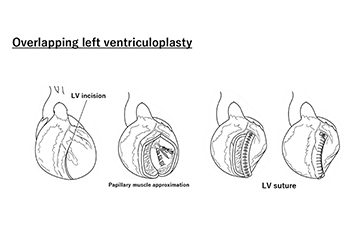
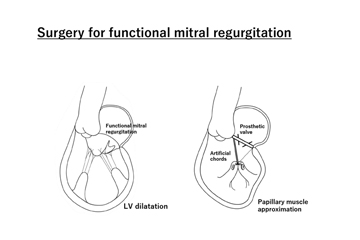
Focusing on research expands future career paths
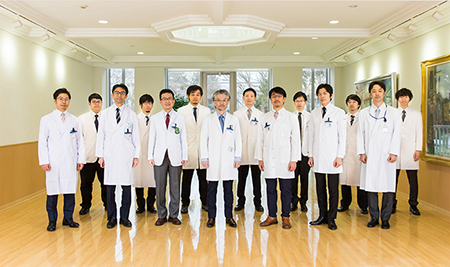
While cardiovascular surgery is a demanding field where long operating hours and high surgical risks are inevitable, it is also one of the areas of practice where one can feel the most satisfaction in curing patients with their own hands. However, there are many young people who are struggling with work-life balance these days, as it takes time to grow as a medical specialist and they often run into obstacles. Professor Wakasa explains the significance of daring to choose the path of research in such a situation as follows:
“It isn’t easy to achieve academic results in the form of research and papers while spending a lot of time on clinical work. However, it is important to have a research mindset and research skills in order to achieve broader and freer career development as a physician. By engaging in research for a specified period of time and obtaining a degree, you will be free to take on whatever pursuit you desire in the future.”
The department offers graduate students a period of research exclusivity, creating an environment in which they can conduct research efficiently under the guidance of a dedicated staff member. Professor Wakasa says, “The department focuses on helping students to develop the ability to carve their own paths, while at the same time trying to provide as efficient an education as possible to increase motivation, adjust working hours, and create a training system that allows students to envision their own career paths. Then, those who have acquired a research mindset and research skills will embark on their own journey and lead the next generation from wherever that journey takes them. I’d like to foster as many professionals like this as possible.”
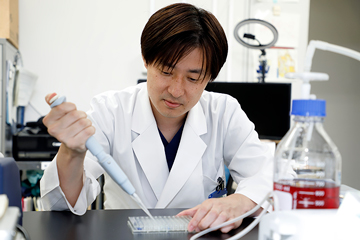
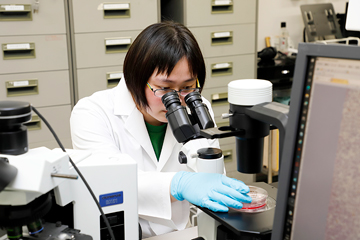
(Interviewed in July 2022)
Training sessions to simulate surgical processes and procedures
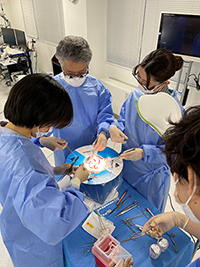
Surgical practice sessions and hands-on training sessions are held for young surgeons and students to not only help them acquire skills but also provide them with opportunities to deepen friendships with other students and residents. Training sessions using pig hearts resembling those of humans are also held regularly to gain more realistic experience. Members of the department are dispatched to affiliated hospitals throughout Hokkaido. While this makes it difficult for them to see each other, they are able to deepen their friendships through research meetings and get-togethers (year-end party and welcome party for newcomers) held twice a year under the auspices of the department.


